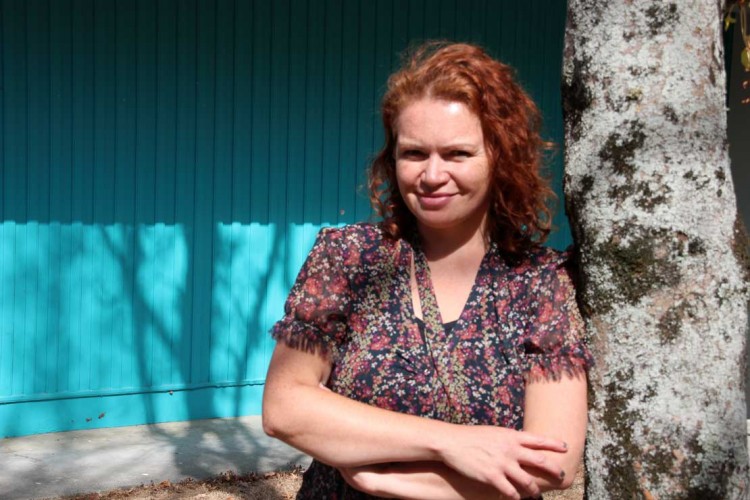When she visited the Chatham Islands to find out about her ancestral links to the Moriori people for her debut novel Where the Rekohu Bone Sings, Tina Dahlberg says she felt a profound connection to the land.
“Sounds a bit dramatic but I felt like the land really spoke to me,” she says.
Exploring the complexities of Pakeha, Māori and Moriori cross-cultural history through fictional characters was a powerful way to write about things that are both deeply personal and difficult to define, says the cover.
Where the Rekohu Bone Sings (Random House) was launched in March and is currently sitting at number two behind The Luminaries on the NZ Bookseller’s weekly bestseller list. Rekohu is the Moriori name for Chathams’ largest island and means ‘misty rain’.
Dr Dahlberg, who writes under the name of Tina Makereti and is of Ngāti Tūwharetoa, Te Atiawa, Ngāti Rangatahi and Moriori descent, says her book reflects her “obsession with identity and having multiple ethnic origins”.
The idea for the story – which spans the Chatham Islands to London, from 1835 to the 21st century – had been incubating since the birth of her daughter Aquila in 2002, when she was given a name that was believed to be Moriori, in keeping with family tradition of bestowing ancestral names.
“I’d always known the story [about a Moriori ancestor], but the question was – now that it had become more real to me – how would a person who is Moriori understand themselves now? I thought if she’s going to carry a name like that we should know about it. I thought it might be something I researched eventually,” she says.
The idea first took shape as a PhD project, which included writing a novel that explores a complex history “with so many layers of false versions”. The result entwines the stories of three characters separated by time but connected by blood ties.
While she grew up knowing more about her Pakeha roots, Dr Dahlberg had immersed herself in Māori history and culture through studying a Postgraduate Diploma of Māori development. She also credits having a social sciences undergraduate degree – a Bachelor of Arts in Social Anthropology and Māori Studies – with giving her a good foundation to work from.
“I think social sciences is a really strong place to create fiction from. It opened up the world for me – well, all books open up the world – but for my path, it was very helpful for what I’m doing.”
For the writing of the book, her two trips to the Chatham Islands, an archipelago 680 kilometres southeast of mainland New Zealand, provided tangible clues and vivid impressions for the book.
“I couldn’t establish on paper my genealogy so it was really important to go there and have a response to the land. I felt there was something stronger here than just visiting a place I’ve never been before.”
Beyond personal connections and imaginative renderings, she had to pull apart the myths and contentious issue of who Moriori were, where they came from and what happened to them. “I found out there’s so much not known, but buried and misconstrued – including by academics.”
She turned to the late Michael King’s authoritative 1989 book, Moriori: A People Rediscovered, as well as the Journal of the Polynesian Society and the Waitangi Tribunal for reliable accounts.
“The novel was a chance to explore the complexities and give the situation context – to show the humanity of all sides of that picture,” she says.
And while she is concerned that she doesn’t contribute to misrepresentations, she says: “You’ve got to take a point of view in a novel, and you can’t control what people think. I’m not making any claims on history or truth.”
Dr Dahlberg, the inaugural winner of the Nga Kupu Ora award for fiction in 2011, for her book Once Upon a Time in Aotearoa, and Huia Publishers’ Best Short Story Award in 2009 for Skin and Bones, a tale that puts a new twist on a classic legend, hopes to see more New Zealand fiction by writers of diverse cultural backgrounds and multiple identities.
“There’s so much in New Zealand fiction that hasn’t been done. We have so many historical and cultural stories starting with Māori, Pasifika, and from the Asian community.”
Having shed light on some of the myths and mistruths surrounding Moriori, she hopes to launch the book in the Chatham Islands in the near future.
She will be appearing at the Auckland Writers Festival on Sunday May 18, Aotea Centre, in a session titled Pieces of History, along with Fiona Kidman, Kerry Donovan Brown and Lawrence Hill.

Cover of Where the Rēkohu Bone Sings.
Related articles
Bloody, funny – the golden age of NZ crime fiction
Maori literary excellence celebrated
Nga Kupu Ora Awards celebrate Maori publishing milestones
First Fiction Winner at Nga Kupu Ora Maori Book Awards
